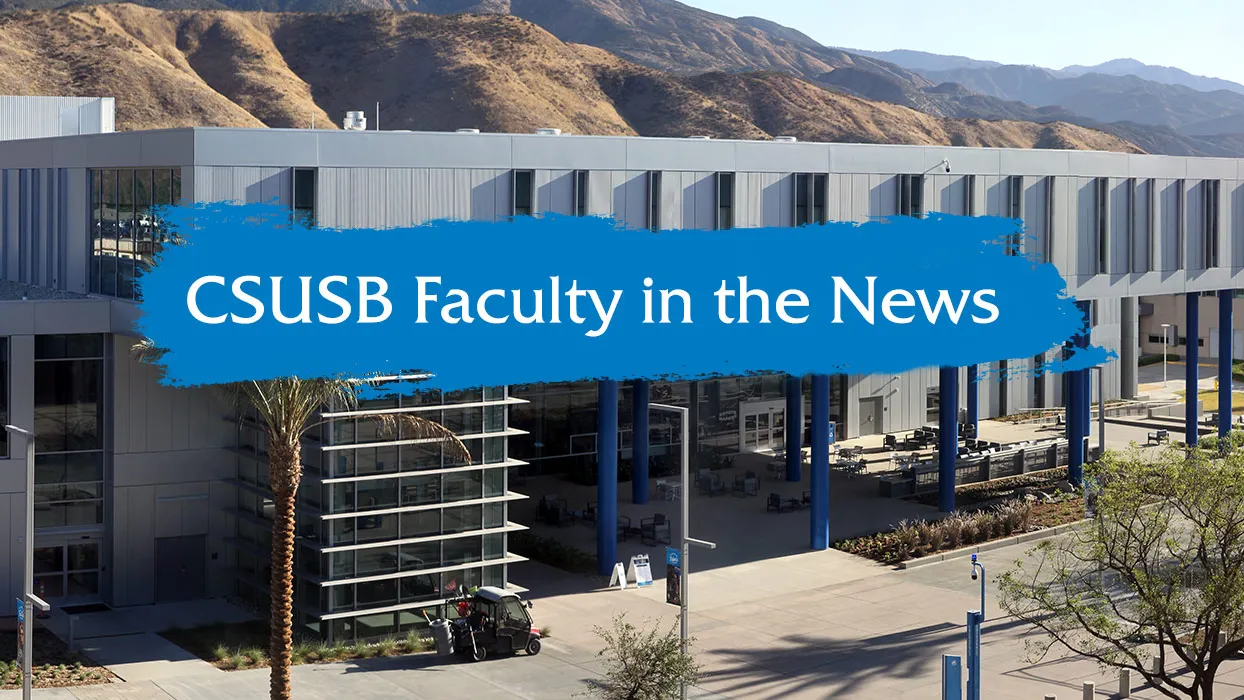NOTE: Faculty, if you are interviewed and quoted by news media, or if your work has been cited, and you have an online link to the article or video, please let us know. Contact us at news@csusb.edu.
CSUSB professor discusses ripple effects of rising fuel prices tied to Russia’s invasion of Ukraine conflict
KTLA TV
March 4, 2021
Daniel MacDonald, associate professor and chair of the CSUSB Department of Economics, was interviewed for a segment on the effect Russia’s invasion of Ukraine is having on the price of diesel fuel used by the trucking industry, and how that could eventually cause prices consumers pay for some goods. Thus far, Russia, a major world producer of oil, has not been prevented from exporting fuel despite major economic sanctions levied against it due to the war.
Still, because demand is rising as supply shrinks, the national average price of diesel fuel has topped $4 per gallon – and more than $5 a gallon in California.
“Companies experience an increase in their costs, specifically transportation costs, and so they just don’t eat up those costs,” MacDonald said. “They pass on some of those costs to the consumer in the form of either higher prices on the final goods, or … surcharges.”
He added, “It’s just going to make it harder on these companies and for these people to make money and to stay competitive when they’re being pushed out of the market by these higher prices.”
Watch the segment at 18:36 KTLA-LA (WB) - KTLA 5 News at 6:30.
Retired kinesiology professor writes on ‘What I Learned as a Physical Educator’
The Physical Educator
Winter 2022
Jerry Freischlag, professor emeritus of kinesiology, published “What I Learned as a Physical Educator” in the journal, The Physical Educator.
The abstract reads, “All professions foster an identity among practitioners. Physical education is no different. How this identify influences and is expressed throughout one’s life and lifestyle is a topic not seen in our literature. In this essay, I provide a perspective for those entering as well as those engaged in the profession to reflect on the scope of being a physical educator. I’ll start with my beginning in the profession.”
The article can be found online at “What I Learned as a Physical Educator.”
CSUSB adjunct professor to speak at ‘Dinosaurs and MOR!’ event at Museum of the Rockies
Sidney (Mont.) Herald
March 3, 2022
Eric Scott, principal paleontologist of Cogstone Resource Management Inc. and adjunct professor at California State University San Bernardino, is one of ten experts who will share 30-presentations at the Museum of the Rockies for its “Dinosaurs and MOR!” lecture event on April 2. The museum is located in Bozeman, Mont., on the Montana State University campus.
Read the complete article at “Museum of the Rockies to host ‘Dinosaurs and MOR!’ event on April 2.”
CSUSB professor claims that what political leaders say – or don’t say – matters
Los Angeles Times
March 4, 2022
A column by Mark Z. Barabak on the relative silence of Republican leaders when some GOP politicians express extremist views included a comment by Brian Levin, who heads the Center for the Study of Hate and Extremism at Cal State San Bernardino.
Levin recalled how just days after the 9/11 attacks, President George W. Bush visited a mosque and spoke eloquently of his respect for Islam. The number of hate crimes against Muslims immediately fell.
Conversely, the divisive rhetoric from Trump and some of his more rabid followers coincided with a significant rise in hate crimes during his administration — nearly 20%, according to the FBI.
“What’s really important is leaders of all parties stand against bigotry and lawlessness,” Levin said. “It’s very simple. Make it consistent.... This shouldn’t be controversial.”
Read the complete article at “Column: Dealing with extremists, some Republican leaders find sorry is the hardest word.”
CSUSB professor comments on hate crimes one year after the Atlanta spa shootings
USA Today via MSN
March 4, 2022
When a man killed eight people last year at three spas in the Atlanta area, many in the community were quick to condemn the killings as clear acts of racism: Six women of Asian descent who worked in massage parlors were killed.
In 2020, hate crime reports in the United States spiked to their highest level in 12 years, and attacks against Asian Americans climbed from 161 in 2019 to 279 a year later, according to the most recent FBI data. Experts say the rapid rise in hate crimes was fueled by racist rhetoric about the COVID-19 pandemic, including from politicians like former President Donald Trump who blamed China for the spread of the coronavirus.
The federal data is likely an undercount because there are systemic barriers that prevent victims from reporting hate crimes and many of the country's 18,000 police departments either don't submit hate crime data or report zero incidents, said Brian Levin, director of the Center for the Study of Hate and Extremism at California State University, San Bernardino.
Read the complete article at “One year after Atlanta spa shootings, 'prevention is the key' to fighting anti-Asian hate crimes.”
These news clips and others may be viewed at “In the Headlines.”
